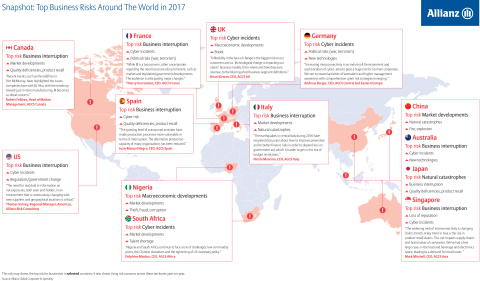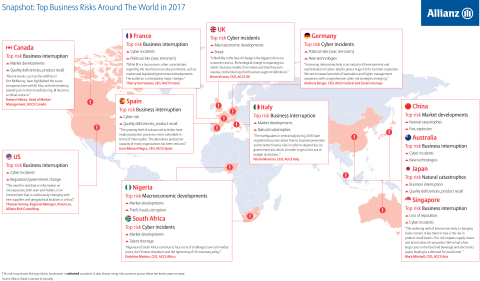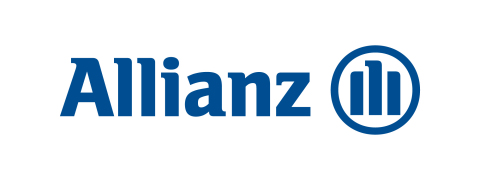NEW YORK--(BUSINESS WIRE)--Companies increasingly worry about the unpredictable business environment where markets are volatile (#2) and political perils, such as protectionism or terrorism, are on the rise. Other growing concerns are digital dilemmas arising from new technologies and cyber risks (#3), as well as natural catastrophes (#4). However, what continues to trouble them most, are losses from business interruption (#1). These are the key findings of the 6th annual Allianz Risk Barometer analyzing corporate risks globally, as well as by region, country, industry and size of business.
Business interruption (BI) continues to lead the ranking for the fifth year in a row (37% of responses), primarily because it can lead to significant income losses, but also because multiple new triggers are emerging, especially non-physical damage or intangible perils, such as cyber incidents as well as disruption caused by political violence, strikes and terror attacks. This trend is driven, in part, by the rise of the “Internet of Things” (IoT) and the ever-greater interconnectivity of machines, companies and their supply chains, which can easily multiply losses in case of an incident. Companies are also facing potential financial losses with the changing political landscape (Brexit, Trump, upcoming EU elections etc.) leading to fears of increasing protectionism and anti-globalization.
“Companies worldwide are bracing for a year of uncertainty,” says Chris Fischer Hirs, CEO of Allianz Global Corporate & Specialty SE. “Unpredictable changes in the legal, geopolitical and market environment around the world are constant items on the agenda of risk managers and the C-suite. A range of new risks are emerging beyond the perennial perils of fire and natural catastrophes which require re-thinking of current monitoring and risk management tools.”
Market developments and volatility (31% of responses) is the second most important business peril in 2017 and the top concern in the aviation/defense, financial services, marine and shipping and transportation sectors, as well as across the Africa & Middle East region in general. In order to anticipate any sudden changes of rules that could impact markets, companies will need to invest more resources into better monitoring politics and policy-making around the world in 2017. According to trade credit insurer, Euler Hermes, a subsidiary of Allianz SE, since 2014, there have been 600 to 700 new trade barriers introduced globally every year.
At the same time, increasing reliance on technology and automation is transforming, and disrupting, companies across all industry sectors. While digitalization is bringing companies new opportunities, it is also shifting the nature of corporate assets from mostly physical to increasingly intangible, bearing new hazards, above all cyber risks (30% of responses). Companies ranked cyber threats a close #3 globally, climbing to #2 across the Americas and Europe and the top risk in Germany, the Netherlands, South Africa and the UK. At the same time, it is the top concern globally for businesses in the information and telecommunications technology and the retail/wholesale sectors.
The threat now goes far beyond hacking and privacy and data breaches, although new data protection regulations will exacerbate the fallout from these for businesses. Increasing interconnectivity and sophistication of cyber-attacks pose not only a huge direct risk for companies but also indirectly via exposed critical infrastructures such as IT, water or power supply. Then there is the threat posed by technical failure or human error, which can lead to long-lasting and widespread BI exposures. In the digitalized production or Industry 4.0 environment, a failure to submit or interpret data correctly could stop production. Businesses need to think about data as an asset and what prevents it from being used. Results also show that smaller companies may be underestimating cyber risk: in this category (revenues <€250 million), cyber ranks only #6. However, the impact of a serious incident could be much more damaging for such firms.
Natural catastrophes (#4) and climate change/ increasing volatility of weather (respectively 24% and 6% of responses) also rank high on the agenda of businesses this year, particularly in Asia where the costliest disaster globally of 2016 occurred – the Kumamoto earthquake (Japan). Natural catastrophes rank as the top concern in Japan and Hong Kong, as well as globally among engineering/construction and power and utilities companies.
Across the Americas, fear of BI, cyber incidents and natural catastrophes are the three major concerns for businesses. “Each of these issues at times may be an unknown or hidden risk exposure, but an exposure that could create potentially both short and long-term consequences to a company’s bottom line,” says Thomas Varney, Regional Manager, Americas, Allianz Risk Consulting. “Understanding of a supply chain exposure requires a partnership between client and carrier.” Fears over macroeconomic developments and the new risk impact of increasing interconnectivity are also rising.
Methodology
The sixth annual Allianz Risk Barometer published by Allianz Global Corporate & Specialty SE (AGCS) is based on a survey conducted among 1,237 risk experts from 55 countries.
Downloads
- Allianz Risk Barometer Overview (with Executive Summary):
- Allianz Risk Barometer 2017:
-
Allianz
Risk Barometer 2017 Appendix:
- Top 20 business risks globally
- Top 10 risks by region
- Top 10 risks by country
- Top 10 risks by industry
- Top 10 risks by company size
About Allianz Global Corporate & Specialty
Allianz Global Corporate & Specialty (AGCS) is the Allianz Group's dedicated carrier for corporate and specialty insurance business. AGCS provides insurance and risk consultancy across the whole spectrum of specialty, alternative risk transfer and corporate business: Marine, Aviation (incl. Space), Energy, Engineering, Entertainment, Financial Lines (incl. D&O), Liability, Mid-Corporate and Property insurance (incl. International Insurance Programs).
Worldwide, AGCS operates in 30 countries with own units and in more than 160 countries through the Allianz Group network and partners. In 2015, it employed more than 5,000 people and provided insurance solutions to more than half of the Fortune Global 500 companies, writing a total of €8.1 billion gross premium worldwide annually.
AGCS SE is rated AA by Standard & Poor’s and A+ by A.M.Best.
For more information please visit www.agcs.allianz.com or follow us on Twitter @AGCS_Insurance LinkedIn and Google+.
Cautionary Note Regarding Forward-Looking Statements
As with all content published on this site, these statements are subject to our Forward Looking Statement disclaimer: Please check our Disclaimer.




